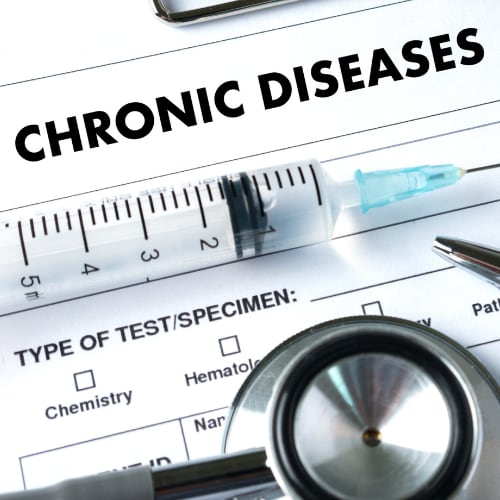 What is Chronic Disease?
What is Chronic Disease?
What is Chronic Disease?

-
Main Ideas
Learning Objective
Understand what Chronic Disease is, how it impacts individuals and society, and what can be done about it.
Behavioral Objective
Consider how you might improve your lifestyle behaviors to reduce the risk of living with Chronic Disease.
Key Thought
90 percent of healthcare expenditures are for people with chronic conditions.
-
Main Ideas
Learning Objective
Understand what Chronic Disease is, how it impacts individuals and society, and what can be done about it.
Behavioral Objective
Consider how you might improve your lifestyle behaviors to reduce the risk of living with Chronic Disease.
Key Thought
90 percent of healthcare expenditures are for people with chronic conditions.
-
Terms
- Centers for Disease Control
- noun
The Centers for Disease Control and Prevention is the national public health agency of the United States under the Department of Health and Human Services, and is headquartered in Atlanta, Georgia.
- Chronic Disease
- noun
A disease of long duration.
-
Terms
- Centers for Disease Control
- noun
The Centers for Disease Control and Prevention is the national public health agency of the United States under the Department of Health and Human Services, and is headquartered in Atlanta, Georgia.
- Chronic Disease
- noun
A disease of long duration.
Introduction
Chronic diseases encompass a broad category of long-term health conditions that persist over an extended period and often progress slowly. These ailments contribute significantly to the global burden of illness, affecting individuals of all ages and backgrounds. Unlike acute diseases, chronic conditions typically do not resolve spontaneously and may require ongoing medical management. Common examples include cardiovascular diseases, diabetes, chronic respiratory conditions, and certain types of cancer. The rise of chronic diseases is closely linked to lifestyle factors, genetic predisposition, and aging populations, posing complex challenges to healthcare systems worldwide. Understanding the causes, risk factors, and effective strategies for prevention and management is crucial for addressing the growing impact of chronic diseases on public health.
Understanding Chronic Disease
The Centers for Disease Control defines chronic diseases as conditions that last one year or more, requiring ongoing medical attention or limiting activities of daily living. These diseases affect nearly half of all Americans and pose a significant public health challenge.
Chronic diseases can impact any part of the body and require continuous medical treatment. While some chronic diseases are incurable, many have treatments that can alleviate symptoms significantly.
Prevalent Chronic Diseases
Chronic diseases range from kidney and heart diseases to chronic lung conditions and brain disorders like Alzheimer's. Here's a brief overview:
Chronic Kidney Disease
This disease affects the body's ability to filter blood, leading to potential cardiovascular issues and necessitating interventions like dialysis or kidney transplants.
Chronic Lung Disease
These diseases, including asthma and COPD, impair lung function, restricting air intake and oxygen exchange, significantly impacting quality of life.
Chronic Heart Disease
Heart diseases disrupt blood circulation and can lead to severe outcomes like heart attacks or chronic heart failure.
Brain Disease
Neurodegenerative conditions such as Alzheimer's erode brain functions, profoundly affecting cognitive and physical capacities.
Autoimmune Disease
Diseases like lupus reflect the immune system's erroneous attacks on healthy tissues, impacting multiple organs and leading to complex health issues.
Cancer
This group of diseases involves uncontrolled cell growth that invades and damages surrounding tissues, with potential to spread throughout the body.
Costs and Solutions of Chronic Diseases
The economic burden of chronic diseases is staggering, with the U.S. spending trillions on healthcare and lost productivity. Effective management includes early detection, lifestyle changes, and in some cases, medical treatments that can mitigate symptoms and improve quality of life.
Understanding risk factors and proactive management can help mitigate the impact of these diseases, potentially reducing the overall health expenditure.
Course Outline
![]() Session Expired from Inactivity
Session Expired from Inactivity
Do you want to?
9618 Jefferson Highway, Suite D-191
Baton Rouge LA 70809-9636
(888) 424-0032 |
support@supplementrelief.com
* Disclaimer: This page is available exclusively for SupplementRelief.com clients. None of the information on this website is intended to replace your relationship with your healthcare provider(s). Nothing should be considered medical advice. The information, knowledge, and experience shared on this website are the opinions of SupplementRelief.com. This site and its content are intended to enhance your knowledge base as YOU MAKE YOUR OWN HEALTHCARE DECISIONS in partnership with your qualified health professional.
* These statements have not been evaluated by the Food and Drug Administration. These products and services are not intended to diagnose, treat, cure, or prevent disease.
* There is NO GUARANTEE OF SPECIFIC RESULTS for the products or services offered, and the RESULTS CAN VARY for each individual. Any results claimed by our customers are based on individual experiences that are unique and cannot be guaranteed.
FirstFitness Nutrition and NuMedica may be promoted and sold on the internet ONLY by Authorized Resellers who have been approved by and have registered their website domain with these companies. They strictly prohibit, and actively monitor, the UNAUTHORIZED SALE or RESALE of their products in ALL online public shopping portals including Amazon, eBay, and others and into other countries. All products purchased in SupplementRelief.com are for PERSONAL USE ONLY and CANNOT BE RESOLD to others. Please report violations of Reseller Policy directly to FirstFitness Nutrition at 800.621.4348 and to NuMedica at 800.869.8100.
The content and photographs on this website are copyrighted or Licensed Material and may not be downloaded for other than personal use. Republication, retransmission, reproduction, or any other use of the content or photographs is prohibited. ©2010-2024 SupplementRelief.com.
Are you sure you want to remove this item?


